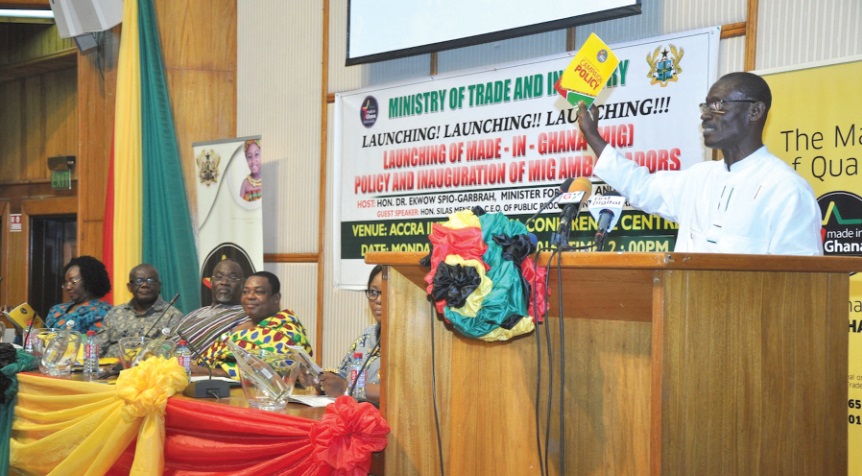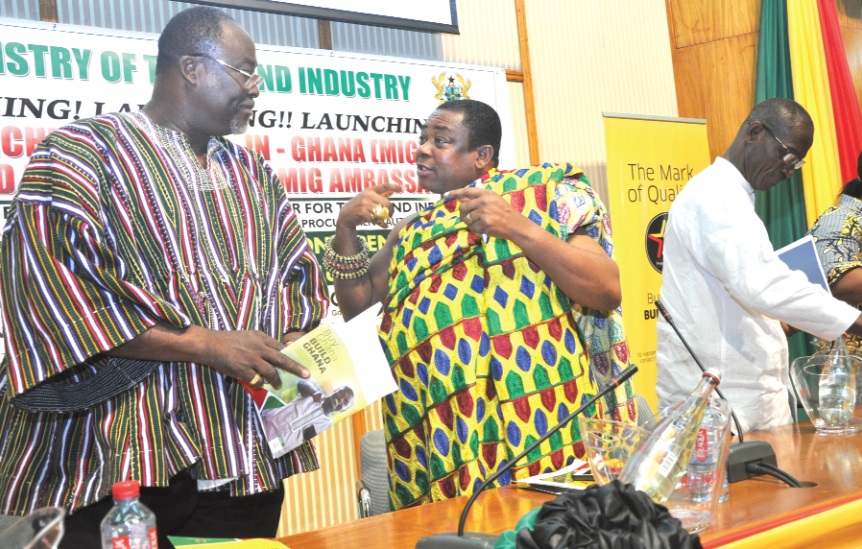
Procurement of Made-in-Ghana goods to become mandatory — Spio-Garbrah
The Ministry of Trade and Industry is considering enacting legislation that will make it mandatory for public institutions to procure made-in-Ghana goods and services.
The move is to ensure that public institutions do not procure foreign goods when there are Made-in-Ghana goods and services over which the country has a competitive advantage in production.
The Minister of Trade and Industry, Mr Ekwow Spio-Garbrah, gave the hint at the launch of the Made-in-Ghana campaign policy in Accra yesterday.
“Down the road, some legislation or regulation will be needed. Some people have worried that even if you have a policy and agencies of government, whether the Executive, the Legislative and the Judiciary that are independent of the Executive, choose to ignore the policy, then what happens?
“How do you enforce the policy? How do you ensure that public agencies and even private ones have a choice of different items for procurement but they consciously try to buy Ghanaian products? We have started with the policy which is based on moral suasion or encouragement for us to do the right thing,” he explained.

Mr Ekwow Spio-Garbrah (left), the Minister of Trade and Industry, sharing some of the highlights with Dr Nana Dankawoso I (2nd right), President, Ghana Chamber of Commerce and Industry, after the launch of the policy. Looking on is Mr Mr Carl Lokko (right), Director, Policy and Strategy, Public Procurement Authority.
Public outrage
The launch comes on the heels of public outrage over the decision by Parliament to refurbish its chamber with imported furniture at a cost of more than GH¢21 million.
The Woodworkers Association of Ghana, an amalgamation of local woodwork artisans and factories, condemned Parliament’s preference for Chinese furniture over its products.
Many have condemned Ghanaians’ appetite for foreign goods, a development which at times puts the cedi on a slide against the major trading currencies.
The 25-page policy document has objectives, including creating awareness among the populace of the need to patronise Made-in-Ghana goods and services and improve the production, processing and distribution value chain of targeted products in terms of raw material availability and adequacy of operational materials, including packaging and technology.
It is also to promote the adoption of high standards in the production, processing and distribution channel, as well as reduce the country’s import bill and improve trade balance through the use of financial and tax incentives, penalties and tariff and non-tariff interventions.
Thematic sectors
The policy prioritises six thematic sectors — agriculture and agro processing (rice, flour, tomatoes, vegetable oil, biscuit, tilapia, fruit juice and poultry), pharmaceuticals and cosmetic products, construction and allied products and leather products — and offers prescriptions for their growth.
The products were selected on criteria, including goods that are already being sufficiently produced locally, products that do not require too much resource to increase their production and products over which the country has competitive advantage in production over imported substitutes.
Its advocates say the policy is geared towards expanding local production and distribution to contribute significantly towards benefits, including job creation, increased household incomes and a drastic reduction in the import bill.
While its critics insist that the policy may be another blueprint for growth and development for shelves which may never be implemented, the policy recommends necessary presidential directives to be issued, particularly to public institutions, to mainstream the patronage of Made-in-Ghana goods and services in their procurement practices.
The policy came into force following the sustained effort by President John Dramani Mahama to encourage the patronage of locally produced goods, culminating in the inauguration of a Made-in Ghana Campaign Committee under the chairmanship of Mr Spio-Garbrah in December 2014.
Prior to that, the National Friday Wear Programme initiative introduced in 2004 and aimed at projecting a unique Ghanaian identity through the extensive use of local fabric and designs as business wear had been one of the most successful projects to whip up interest in a local product.
No compromise on quality
The Chief Executive Officer of the Public Procurement Authority (PPA), Mr Samuel Silas Mensah, in a speech read on his behalf, said while the aim of the policy was to increase demand for local goods, quality would not be compromised, as public health and safety were at stake.
“The policy will engender scientific research and technological development, as manufacturers increasingly seek ways to attain and maintain higher standards for their products and services. It is imperative that they must aim at excellence, diligence and be thorough in what they do, so as to continually improve processes, products and services at any and every stage of the supply chain,” he said.
With very poor perceptions of Made-in-Ghana goods inhibiting patronage, even by public institutions, he observed that the policy would be successful only if decision makers in the ministries, departments and agencies with authority over procurement decisions received the necessary periodic orientation on how and why to procure locally produced goods and services.
Mr Mensah, however, said the PPA would continue to organise training programmes for the heads of MDAs, spending officers and procurement officers to build capacity on the wide range of tools provided by the country’s procurement law.
The occasion was also used to announce ambassadors for the Made-in-Ghana campaign, including the Managing Director of the Graphic Communications Group Limited, Mr Ken Ashigbey.